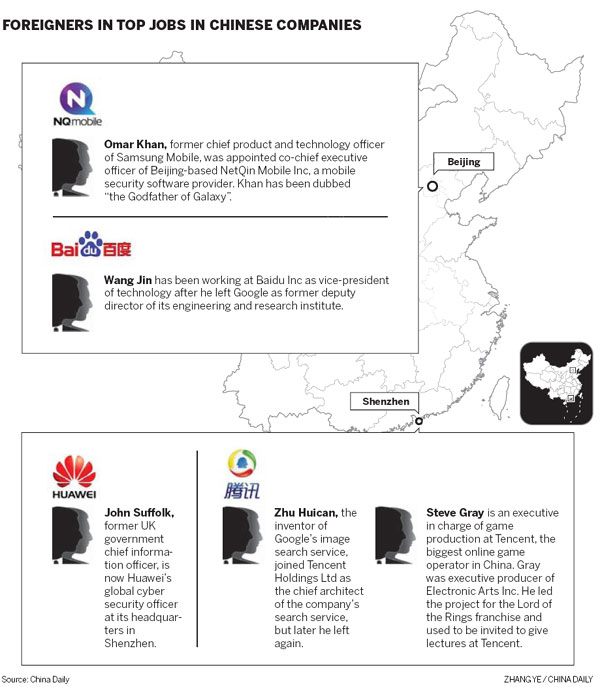Eyeing up jobs with Chinese companies
Updated: 2012-12-03 09:05
By Shen Jingting, Gao Yuan, Chen Limin and Tuo Yannan (China Daily)
|
||||||||
Increasing number of opportunities emerging as firms expand abroad
More foreigners are employed by or showed a stronger interest in working for China-based companies against a backdrop of the rise of the country's economy and the global expansion of many Chinese firms.
Related reading: Challenge to expats for the top positions
Huawei Technologies Co, the world's second largest telecoms equipment maker by revenue, surprised people last year by inviting John Suffolk, former UK government chief information officer, to act as its global cyber security officer.
Suffolk is one of the most influential foreigners to work with a Chinese company. He works at Huawei's headquarters in Shenzhen, a coastal city in South China's Guangdong province, and reports directly to Huawei's chief executive officer, Ren Zhengfei.
After Suffolk joined Huawei, Omar Khan, former chief product and technology officer of Samsung Mobile, was appointed co-chief executive officer of Beijing-based NetQin Mobile Inc, a mobile security software provider.
Khan was dubbed "the Godfather of Galaxy" after launching perhaps one of the best series of smartphones the Android mobile system has seen yet - the Samsung Galaxy S line.
The trend of more talented foreigners joining Chinese companies is just beginning, analysts said. Yang Haifeng, a telecoms expert who is also chief editor of Communications World Weekly, said the vigorous Chinese economy, coupled with overseas expansion of many Chinese businesses, would create many opportunities for skilled people worldwide.
"Chinese companies can provide them (expatriates) with promising prospects, good experience and, of course, generous salaries," said Yang.
Duncan Clark, chairman of BDA China, a consultancy company that follows China's IT industry, said some companies in China are beginning to "transcend their Chinese-ness".
"In companies, I think we are almost beyond the 'them and us' of foreigners and Chinese. Once a company is founded by entrepreneurs, it doesn't really matter where the founders are from. We are entering the age of the 'multinational startup'," Clark said in an email sent to China Daily.
This new breed of company is far more attractive to expatriates to work for than the traditional Chinese company, he added.
ZTE Corp, the world's fifth telecoms equipment vendor, earns more than half of its revenue from overseas markets. In some developed countries, such as in the United States, about half of ZTE's management team are expatriates, according to Dai Shu, director of corporate branding and communications at ZTE.
Dai said ZTE provides an equal playing field when it comes to promoting talented people. "Sometimes, foreigners have more advantages than Chinese staff because we measure performance largely by the results they deliver," Dai said, pointing out that foreigners usually produce good results because they are culturally more close to clients.

 Relief reaches isolated village
Relief reaches isolated village
 Rainfall poses new threats to quake-hit region
Rainfall poses new threats to quake-hit region
 Funerals begin for Boston bombing victims
Funerals begin for Boston bombing victims
 Quake takeaway from China's Air Force
Quake takeaway from China's Air Force
 Obama celebrates young inventors at science fair
Obama celebrates young inventors at science fair
 Earth Day marked around the world
Earth Day marked around the world
 Volunteer team helping students find sense of normalcy
Volunteer team helping students find sense of normalcy
 Ethnic groups quick to join rescue efforts
Ethnic groups quick to join rescue efforts
Most Viewed
Editor's Picks

|

|

|

|

|

|
Today's Top News
Health new priority for quake zone
Xi meets US top military officer
Japan's boats driven out of Diaoyu
China mulls online shopping legislation
Bird flu death toll rises to 22
Putin appoints new ambassador to China
Japanese ships blocked from Diaoyu Islands
Inspired by Guan, more Chinese pick up golf
US Weekly

|

|








